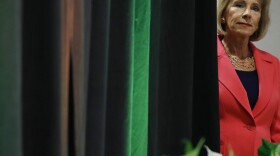Connecticut has received 2 federal grants that will help victims of sexual assault seeking justice against their attacker.
When a victim is sexually assaulted, a sexual assault, or rape kit is crucial. It can corroborate the victim's account of the assault, and not only help identify a suspect, but also link cases that could identify serial rapists. But submitting to the test can be traumatizing for the victim.
“Having to go to a Hospital and undergo what sometimes seems like another violation of your body,” said Connecticut's first lady Cathy Malloy, a member of Connecticut's Sexual Assault Kit Working Group, “And all the courage it took to get you there to that point, that the evidence that was collected will sit on a shelf.”
Connecticut has a backlog of nearly 2,000 kits that have been only partially tested or not tested at all because of a lack of funding. Some of those kits have been sitting for years, but Connecticut will now use 2 new federal grants totaling 2.8 million to test and process all of those kits.
“We owe it to each survivor and the residents of our state to take a close look at every one of these kits, and with this funding we will be able to do so,” said Laura Cordres is the Executive Director of the Connecticut Alliance to End Sexual Violence.
The funding will also pay for more training for law enforcement and state's attorneys, and a new method of testing that searches for the presence or absence of male DNA.
Governor Dannel Malloy says this new method “will allow the state to increase capacity, efficiency, and quality of DNA screenings.”
Cordres expects upwards of 100 of these unprocessed kits will contain DNA evidence that could lead to the reopening of some sexual assault cold cases.
Copyright 2017 Connecticut Public Radio





